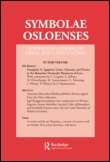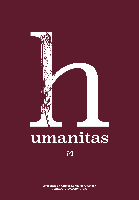
Cahiers des Etudes Anciennes
metrics 2024
Advancing Knowledge in Classical Studies
Introduction
Cahiers des Etudes Anciennes is a distinguished scholarly journal dedicated to the field of Classics, published by Université du Québec à Trois-Rivières. With its ISSN 0317-5065 and E-ISSN 1923-2713, this journal has been a vital platform for the dissemination of research since its inception in 1976, achieving Open Access status in 2006 to enhance accessibility and encourage wider readership. Operating from Canada, specifically Trois-Rivières, Quebec, this journal has cultivated an academic environment that fosters critical dialogue among classics scholars. With a Scopus ranking of 94 out of 170 in the Arts and Humanities - Classics category, placing it in the 45th percentile, it currently holds a Q3 quartile ranking, highlighting its growing influence in the academic community. Cahiers des Etudes Anciennes aims to publish high-quality research articles, reviews, and essays that contribute to the understanding of ancient civilizations, texts, and cultures, making it an invaluable resource for researchers, professionals, and students alike looking to explore the depths of classical studies.
Metrics 2024
 0.10
0.10 -
- 0.10
0.10 5
5Metrics History
Rank 2024
Scopus
JCI (Web Of Science)
Quartile History
Similar Journals

QUADERNI URBINATI DI CULTURA CLASSICA
Advancing Scholarly Dialogue in Classical StudiesQUADERNI URBINATI DI CULTURA CLASSICA is a distinguished academic journal dedicated to the interdisciplinary exploration of Classics, Linguistics, and Literary Theory. Published by ACCADEMIA EDITORIALE PISA-ROMA, this journal serves as a vital scholarly platform for researchers and professionals alike, facilitating in-depth discussions and analyses that contribute to these evolving fields. With an ISSN of 0033-4987 and an E-ISSN of 1724-1901, it boasts a robust Scopus ranking, placing it within the second quartile in Classics and the third quartile in related disciplines as of 2023. Although it is not an open-access journal, QUADERNI URBINATI DI CULTURA CLASSICA remains essential for those engaged in the study of language, literature, and classical cultures, encouraging scholarly exchange and innovation from its base in Rome, Italy. Researchers and students will find valuable insights and methodologies within its pages, making it a key resource for fostering academic growth and understanding.

Eikasmos-Quaderni Bolognesi di Filologia Classica
Advancing Scholarship in Classics and LinguisticsEikasmos-Quaderni Bolognesi di Filologia Classica is a distinguished journal that focuses on the fields of Classics, Linguistics, and Language, published by PATRON EDITORE S R L in Italy. With its ISSN 1121-8819, the journal has been a vital platform for the dissemination of scholarly work from 2011 until 2021, contributing significantly to the dialogue within these disciplines. Although recognized in the lower quartiles (Q4) of various categories within Scopus, including Classics and Linguistics, and having ranked in the 37th and 19th percentiles respectively, Eikasmos stands as an invaluable resource for researchers, academics, and students committed to exploring classical philology and its interconnections with modern linguistic studies. The absence of an open access model underscores the importance of institutional support in accessing this scholarly work, which continues to enrich the academic landscape of classical studies.

Boletim de Estudos Classicos
Fostering Innovation in Classics and EducationBoletim de Estudos Clássicos is a distinguished scholarly journal dedicated to the field of Classics and Education, published by COIMBRA UNIV PRESS. Since its transition to an open-access format in 2013, the journal has aimed to broaden the accessibility of high-quality research and critical discussions within these disciplines. Despite its current categorizations in the Q4 quartile for both Classics and Education, the Boletim has a unique opportunity to serve as a platform for emerging voices and innovative research, fostering growth in an otherwise underrepresented area. Based in Portugal, the journal invites contributions that encompass a wide range of topics, from ancient texts and historical analysis to educational methodologies and pedagogy. With an ISSN of 0872-2110 and an E-ISSN of 2183-7260, the journal actively seeks to attract researchers, professionals, and students dedicated to the exploration of classical studies. The journal's address is RUA DA ILHA, NO 1, COIMBRA 3000-214, PORTUGAL, where its contributors and editorial board strive to inspire a deeper understanding of classical heritage and its relevance to contemporary education.

AEVUM-RASSEGNA DI SCIENZE STORICHE LINGUISTICHE E FILOLOGICHE
Cultivating Scholarly Discourse in Linguistic Heritage.AEVUM-RASSEGNA DI SCIENZE STORICHE LINGUISTICHE E FILOLOGICHE is a distinguished academic journal published by VITA PENSIERO, based in Italy, focusing on the intricate fields of historical linguistics, philology, and cultural studies. With ISSN 0001-9593 and E-ISSN 1827-787X, it has been a significant contributor to scholarly discourse since its inception in 1979, with publications dating from 2001 to 2020 and from 2022 to 2023. Although it is categorized in Quartile Q4 across various disciplines including History, Linguistics, Literature, and Philosophy for the year 2023, AEVUM serves as a vital platform for nurturing discourse and advancing research in its fields, particularly appealing to scholars and professionals seeking to explore the intersections of language and culture. While the journal is not open access, it continues to maintain academic rigor and relevance, encouraging contributions that reflect current trends and theoretical developments. Researchers and students alike can benefit from its rich repository of language and historical research, drawing connections that contribute to a profound understanding of human society through the lens of language.

Symbolae Osloenses
Exploring the Depths of Ancient WisdomSymbolae Osloenses, published by TAYLOR & FRANCIS LTD, is a distinguished journal in the field of Classics, with a rich history dating back to its inception in 1922. This UK-based journal has continuously contributed to the scholarly discourse surrounding ancient cultures, languages, and literature, making it a crucial resource for researchers, educators, and students alike. Though it operates under a subscription model, its impact on the academic community is underscored by its recent inclusion in the 2023 Scopus rankings, where it holds a respectable position in the 65th percentile among its peers. With decades of published research spanning from 1924 to 2023, Symbolae Osloenses remains committed to fostering robust academic dialogue and advancing knowledge in the Classics, catering to a diverse readership seeking to explore the nuances of classical studies.

GYMNASIUM
Bridging Timeless Texts and Contemporary TeachingGYMNASIUM, published by Universitätsverlag C Winter Heidelberg GmbH, is an academic journal dedicated to the fields of Classics and Education. Since its inception in 1970, the journal has served as a platform for scholarly discourse, focusing on the intersection of classical studies and educational methodologies. Despite its discontinuation from Scopus coverage post-2021, GYMNASIUM remains an important resource for researchers, professionals, and students, fostering a deeper understanding of ancient texts and their relevance in contemporary educational frameworks. Current rankings place the journal in the Q4 quartile in both Classics and Education categories, reflecting its niche yet significant contribution to these fields. Researchers can access the journal's past issues through various academic libraries in Germany, enhancing interdisciplinary study and promoting scholarship across broader educational horizons.

Humanitas-Portugal
Illuminating the Path of Historical InquiryHumanitas-Portugal is a distinguished open access journal published by IMPRENSA UNIV COIMBRA that has been fostering scholarly dialogue since its inception in 1947. With an ISSN of 0871-1569 and E-ISSN 2183-1718, the journal serves as a platform for rigorous academic work in the fields of Archeology, Classics, History, Philosophy, and Religious Studies. Although positioned in the Q4 quartile by Scopus rankings, its commitment to accessibility and knowledge dissemination in Portugal highlights its significance to the academic community. Researchers and students can access articles openly, encouraging a broader engagement with various disciplines. With its convergence of studies from 2018 to 2024, Humanitas-Portugal continues to contribute to the understanding of human culture and thought, making it an essential resource for anyone invested in the humanities.

Auster
Unlocking knowledge for a transformative educational future.Auster is a prominent open-access journal dedicated to advancing interdisciplinary research within the fields of Humanities and Educational Sciences. Published by the esteemed Universidad Nacional de La Plata, specifically by the Faculty of Humanities and Educational Sciences, this journal has been a cornerstone for scholarly discourse since its establishment in 1996. With an ISSN of 1514-0121 and an E-ISSN of 2346-8890, Auster ensures wide accessibility to innovative research and critical analyses. Its commitment to open access fosters an inclusive academic environment, allowing researchers, students, and professionals in Argentina and beyond to engage with high-quality content that stimulates new ideas and interdisciplinary collaboration. The journal strives to publish timely, relevant articles that explore contemporary challenges in humanities and education, thereby positioning itself as an essential resource for anyone invested in these dynamic fields.

Cuadernos de Filologia Clasica-Estudios Griegos e Indoeuropeos
Fostering Scholarly Dialogue in Classics and LinguisticsCuadernos de Filologia Clasica-Estudios Griegos e Indoeuropeos, published by Universidad Complutense de Madrid, serves as a vital platform in the fields of Classics and Linguistics. With an ISSN of 1131-9070 and an E-ISSN of 1988-2637, this journal showcases rigorous academic research that spans both Greek studies and Indo-European linguistics. Recognized within the Q1 quartile in Classics and the Q2 quartile in Linguistics and Language, it highlights its standing among peers in these disciplines, particularly reflecting its commitment to advancing scholarly conversation. Though currently lacking in Open Access options, its emphasis on quality content ensures it maintains an intellectual influence, as evidenced by its ranking of #112 in Classics and efforts to engage researchers and students alike. The journal's coverage from 2011 to 2024 positions it as a rich historical resource, while its address in Madrid places it at the heart of European classical studies. By offering insights into the fundamental aspects of language, literature, and ancient cultures, Cuadernos de Filologia Clasica remains a critical resource for those seeking to deepen their understanding of the classical world and its enduring linguistic legacies.

Cahiers Mondes Anciens
Connecting Scholars Through Timeless DiscoveriesCahiers Mondes Anciens is a distinguished Open Access journal dedicated to advancing the field of ancient studies, encompassing a wide array of disciplines such as archaeology, history, and cultural heritage. Published by CAHIERS MONDES ANCIENS, based in Paris, this journal has been providing seamless access to groundbreaking research since its inception in 2010, embodying a commitment to democratizing knowledge within the academic community. With an ISSN of 2107-0199, Cahiers Mondes Anciens offers a platform for researchers and scholars to share innovative findings, critical analyses, and interdisciplinary approaches that enrich our understanding of the ancient world. The journal is renowned for its rigorous peer-review process, ensuring the highest standards of scholarship. By fostering a vibrant community of academics, it plays a crucial role in the ongoing discourse surrounding ancient civilizations, making it an essential resource for professionals, students, and enthusiasts alike.